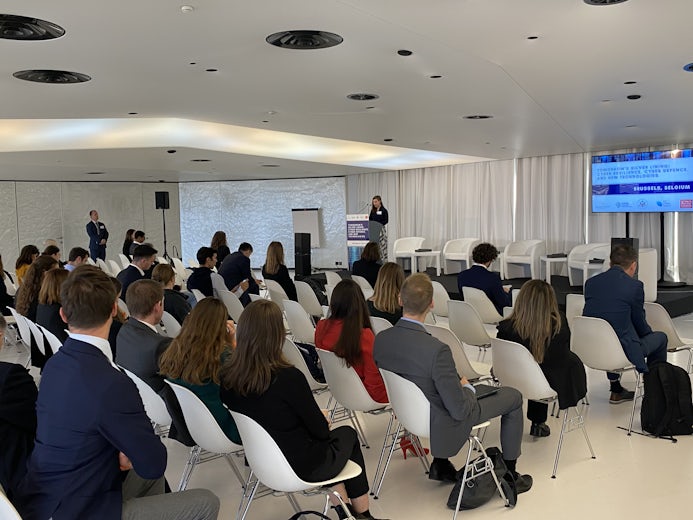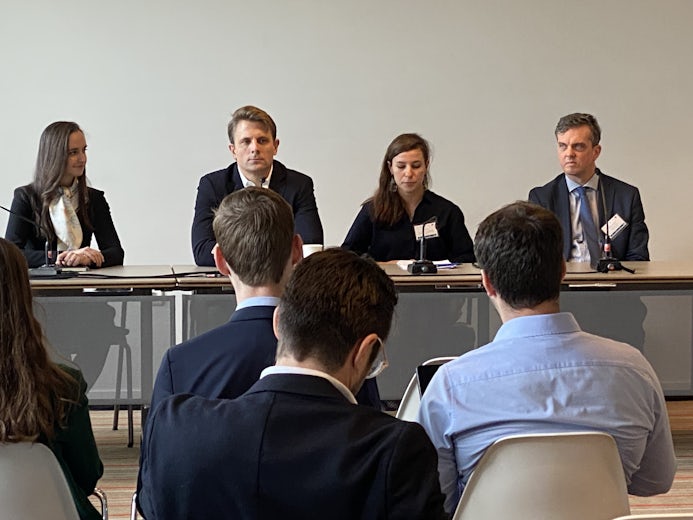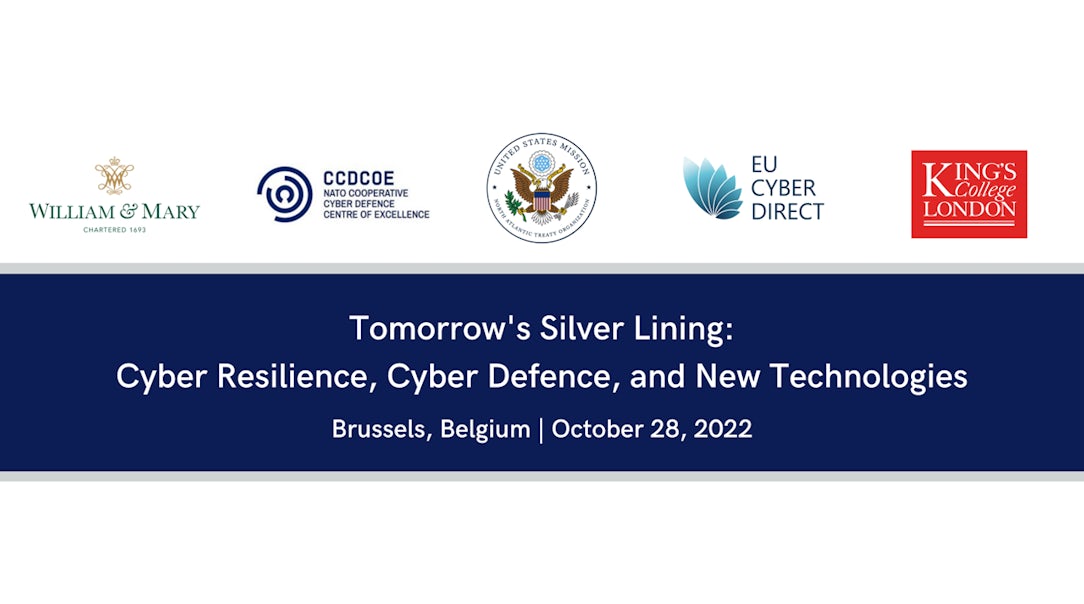On 28 October 2022 EU Cyber Direct, together with William & Mary, the NATO Cooperative Cyber Defence Center of Excellence (CCDCOE), and King's College London organised the conference Tomorrow's Silver Lining: Cyber Resilience, Cyber Defence, and New Technologies.
This event aimed to bridge a conversation about the emerging cybersecurity landscape and brought together state-of-art knowledge and expertise from government, military, industry, academy, and civil society.
For more information, read the event report or watch the recording.
Agenda
09:00 - 09:30 Welcome coffee and networking
09:30 - 09:45 Welcome remarks and address
- Dr Teresa Longo, Associate Vice Provost for International Affairs and Executive Director, Reves Center for International Studies, W&M
- Mr Richard Holtzapple, Deputy Permanent Representative, U.S. Mission to NATO
09:45 – 10:45 Crossing the Rubicon: When A Cyber Conflict Becomes A (Cyber) War
Policymakers and scholars have spent a fair amount of energy trying to understand how new technologies might impact the nature of conflict, and in particular how the use of cyber operations will change our perception of war and peace. This led to the emergence of new policy communities, university departments, and sometimes new vocabulary to describe the new uncharted world of (cyber) conflict. And yet, as the challenges such as cyber espionage, ransomware operations, interference operations, or the ongoing war in Ukraine demonstrate, both researchers and policymakers are still struggling with a basic question: when does a cyber conflict become a (cyber) war? The answer to this question carries significant implications for defence policies and planning, which is why governments have avoided formulating clear demarcation lines. But what if we have already crossed the Rubicon? How can NATO and its partners better anticipate and prepare for what lies beyond?
- Dr Joseph Devanny, Lecturer in War Studies and Deputy Director of the Centre for Defence Studies, King's College London
- Mr Christian-Marc Lifländer, Head of the Cyber and Hybrid Policy Section (CHP), NATO
- Dr Monica Kaminska, Postdoctoral Researcher, The Hague Program on International Cyber Security, Leiden University – Institute of Security and Global Affairs
- Mr Oleksandr Potii, Deputy Chairman, State Service of Special Communications and Information Protection of Ukraine
- Ms Andrea G. Rodríguez, Lead Digital Policy Analyst, European Policy Centre
10:45 – 11:15 Coffee break and networking
11:15 – 12:30 Workshops
Breakout group #1: Cyber Resilience and Cyber Defence
NATO’s core activities include deploying military capabilities in and through the highly contested cyber domain. Even though most EU and NATO countries have declared developing military cyber organisations and formations such as cyber commands or cyber forces, a few existing case studies and comparative research show that their maturity is below official statements and what would be expected given many years of their existence. Analysts have identified a range of challenges (largely falling into legal, political, structural, and resource constraints categories). In that context, alliance-wide interoperability is put under question. On the EU side, what changes will the EU military vision and strategy on cyberspace as a domain of operations and the ongoing development of the military concept on cyber defence for EU-led military operations and missions bring? This session explored how these countries and their global partners could better align interests, capabilities, strategy, and doctrines, and enhance joint approach by better matching NATO’s operational requirements and strategic ambitions in the cyber domain.
- Ms Sally Daultrey, Intelligence Analyst, Seven Signals Ltd
- Mr Nigel Inkster, Senior Adviser for Cyber Security and China, The International Institute for Strategic Studies
- Ms Piret Pernik, Cybersecurity Researcher, NATO Cooperative Cyber Defence Center of Excellence
- Mr Kaan Sahin, Cyber and Hybrid Policy Officer, NATO
- Dr Max Smeets, Senior Researcher, Center for Security Studies (CSS), ETH Zurich; Director of the European Cyber Conflict Research Initiative
Breakout group #2: Cyber Security and New Technologies / Emerging Disruptive Technologies (EDTs)
Emerging and disruptive technologies (EDTs) present both risks and opportunities. Greater reliance on EDTs will likely involve growing uncertainty and complexity from the ‘boardroom’ to the ‘battlefield’. The aim of the panel was to explore how the difficulties that stem from the contested definition of EDTs, their dual-use nature, and ethical considerations. Their uncertain roles in future security and defence applications impact cyber defence in multiple ways. In particular, we discussed how an unclear and contested conceptual understanding of dual-use EDTs may lead to inconsistent approaches to human oversight, strategic planning, foresight, and procurement. Civil-military synergies and human-machine teaming are two of the main issues highlighted by the panel participants. Given that a lot of innovation originates in the commercial sector, specifically in start-ups and small and medium-sized enterprises (SMEs), the inclusion of these actors into the cybersecurity and defence markets and supply chains will be important going forward.
- Dr Raluca Csernatoni, Fellow, Carnegie Europe
- Dr Amy Ertan, Cyber and Hybrid Policy Section (CHP), Emerging Security Challenges Division (ESC), NATO
- Dr Lucas Kello, Associate Professor of International Relations, Oxford University
- Ms Zoe Stanley-Lockman, Innovation Officer, Innovation Unit, Emerging Security Challenges Division, NATO
- Dr Bruno Volckaert, Professor, IDLab, Ghent University
12:45 - 13:00 Report outs from break-out groups
- Dr Joseph Devanny, Lecturer in War Studies and Deputy Director of the Centre for Defence Studies, King's College London
- Ms Piret Pernik, Cybersecurity Researcher, NATO Cooperative Cyber Defence Center of Excellence
- Dr Raluca Csernatoni, Fellow, Carnegie Europe
13:00 - 13:15 Closing remarks
Lightning Presentation by the William & Mary Global Innovation Challenge x NATO Countering Disinformation Competition featuring the winning synopses
13:15 - 14:30 Lunch
14:00 - 16:00 Design Thinking and Entrepreneurial Approaches to Cyber Defence
This was a closed-door workshop for next-generation leaders. Participants were given a specific challenge faced by NATO in the cyber defence realm. They went through a guided session on how to apply design thinking to this task, and then were given space to ideate. At the end of the workshop, participants pitched their solutions to the challenge.
- Dr Amy Ertan, Cyber and Hybrid Policy Section (CHP), Emerging Security Challenges Division (ESC), NATO [facilitator]
- Mr Graham Henshaw, Executive Director, Miller Entrepreneurship Center, William & Mary [facilitator]
- Dr Anthony Stefanidis, Professor of Computer Science, William & Mary [facilitator]





